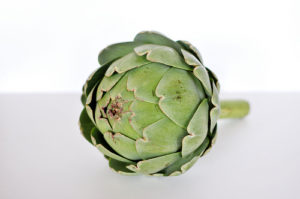Short Answer:
Yes, Artichoke is Paleo!
What is an Artichoke?
Artichoke is an edible flower bud that belongs to the thistle family. This plant is native to Ancient Greece and Rome and is used for culinary and medicinal benefits. Artichoke can be found in Europe, America and Middle East. It has a beautiful armor-like exterior and a tasty sweet heart. Artichoke is not really a vegetable but rather a flower bud of the plant. The bud is composed of triangular scales which are compactly arranged in a whirl-fashion around the choke. The choke is the fuzzy mass of fine hair-like material where underneath lies the heart.
Like many flowers, artichoke has thick green outer petals and thin yellow inner edible petals. Artichoke is a tasty and healthy addition to salads and pizzas.
Nutritional Value of Artichoke
While not technically a vegetable, artichoke is often consumed because of its nutritional contents. Artichoke is low in fat and cholesterol and is rich in many vitamins and minerals. This includes vitamin A, B, C, D and K, thiamine, riboflavin, niacin, folate and minerals such as calcium, iron, manganese, potassium, phosphorus, sodium, zinc and dietary fiber.
Artichoke is also packed with essential antioxidants and phytonutrients like quercetin, rutin, gallic acid and cynarin which has many health benefits.
Health Benefits of Artichoke
Artichoke is known for its amazingly high antioxidant contents. It is one of the most nutritious food around and has a long list of health benefits.
Digestive Support and Liver Detoxification
Artichoke falls into the prebiotic group of food that contains indigestible nutrients that feed the beneficial bacteria in the gut area. It is included in the GAPS diet, a specially created diet for restoring digestive tract and gut health. Artichoke also has significant amounts of fiber that is associated with reduced inflammation in the gut. Fiber adds bulk to the food which helps in keeping regular bowel movements and decreasing symptoms of diarrhea, constipation and bloating.
Silymarin is a flavanoid in artichoke that is effective in protecting the liver. Cynarin is a substance that helps in stimulating the production of bile in the liver and responsible for proper digestion and absorption of nutrients.
Cardiovascular Health
Cynarin found in artichokes is an important substance in lowering blood cholesterol and improving blood circulation. Artichoke is also rich in potassium which is an essential mineral in regulating blood pressure and heart rate, hence, lowered risk of heart attack and cardiovascular diseases.
Antioxidants and Anti-cancer
Artichoke has a powerful ability to fight oxidative stress in the body through the abundant antioxidants present in it. It is one of the vegetables that have the highest antioxidant levels. These antioxidants are quercetin, rutin and gallic acids. High amounts of these antioxidants are associated with reduced risks of cancers by preventing tumors from propagating. The flavanoid sylimarin was found to be a skin cancer chemopreventive agent which has the capability of reducing risk or even preventing skin cancer.
Bone Health
Another health benefit of potassium found in artichokes is that it plays a role in the formation of bones and reduces vascular calcification. Magnesium alternatively, helps in the absorption of calcium in body and is essential in increasing bone density that may later on contribute to reduced chances of osteoporosis.
Overall Skin Health
Antioxidants and Vitamin C are both abundant in artichokes. They are responsible for healthy skin, preventing dryness and aging. Vitamin C is one of the contributors of collagen development which is essential in keeping a healthy glowing skin and healing wounds quickly.
Iron Deficiency Prevention
Artichoke is one of the plant-based sources of iron. Low levels of iron can result to weakened immune system, fatigue and even digestive disorders like IBS and Leaky Gut Syndrome. A more serious condition associated with low levels of iron in the body is anemia, a condition when the body could no longer produce sufficient amount of hemoglobin.
Brain Function
Artichoke has a vasodilator quality that allows more oxygen to reach the brain for elevated cognitive function. The Vitamin K present in artichoke can help protect against neuronal damage and degeneration preventing cognitive diseases like Alzheimer’s disease and dementia.
Metabolic Function
Manganese is another nutrient found in artichokes which is used in the metabolism of amino acids, fatty acids and cholesterol. This enables the body to properly utilize the nutrients that enters it.
What Experts Say About Artichoke
To keep that gut healthy throughout the Holidays, it’s important to keep the ‘good’ bacteria of the gut lining in check and flourishing. – Dr. Loren Cordain
Berries may be class pet in the antioxidant department, but the humble artichoke is one of the most nutritious foods around. – Mark Sisson
All you ever wanted to know about Artichoke and Paleo
The Paleo Diet. Paleo Diet Guide to Keep Your Gut Healthy for the Holidays
http://thepaleodiet.com/paleo-diet-guide-keep-gut-healthy-holidays/
Mark’s Daily Apple. Smart Fuel
http://www.marksdailyapple.com/artichoke/#axzz4GiUJgxQR
Paleo Grubs. Foods You Can Eat on the Paleo Diet
http://paleogrubs.com/paleo-diet-food-list
Eat Drink Paleo. How To Prepare & Cook Artichokes
http://eatdrinkpaleo.com.au/how-to-prepare-cook-artichokes/
Nutrition and You. Artichoke Nutrition Facts
http://www.nutrition-and-you.com/artichoke.html
Organic Facts. Health Benefits of Artichokes
https://www.organicfacts.net/health-benefits/other/health-benefits-of-artichokes.html
Did we miss anything?
Comment below and let us know what you think. Do you agree with our conclusion?

